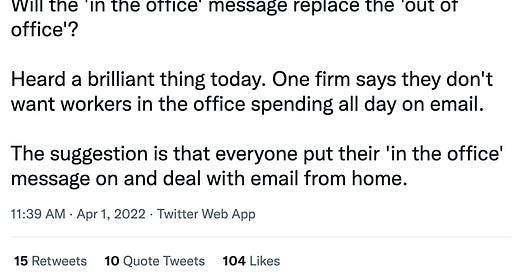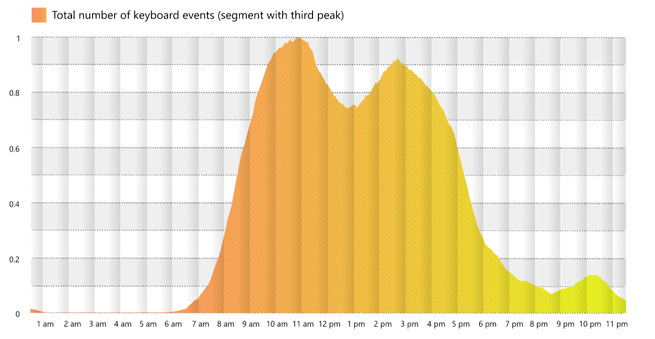Is the 'in the office' is about to replace the OOO?
ALSO: what role does status play in our jobs?
Thank you to the huge number of people who shared the newsletter last week - adding another five hundred readers. If you’re new here, here’s some recent posts that you might find interesting:
how toxic culture is driving the Great Resignation (and how to fix toxic culture)
How did you go bankrupt? Two ways. Gradually, then suddenly
Interesting to see more challenges ahead for the commercial real estate sector. This week a long term advocate of the return to offices, the boss of JP Morgan Chase, acknowledged that the world has changed and the office wouldn’t be a mandatory part of life in the bank. JP Morgan Chase is the third biggest tenant of New York office space (history fans will know that it was founded by Aaron Burr, off of Hamilton).
Going forwards CEO Jamie Dimon said that he expects 40% of JPM employees to work hybrid and 10% of them to work fully remotely.
Having reduced their office footprint for each of the last two years they’ve announced more cuts will follow.
Listen: a refreshing take from inside commercial real estate
Is your office always freezing cold?
I had a great discussion this week when I met Charlotte Laing (Head of Marketing at Metrikus) at a roundtable discussion. We were talking about the quietly sexist tradition of heating office buildings for men’s preferences, rather than women’s. If you’re not a woman and haven’t experienced this first hand, no doubt you’ll have seen female colleagues with blankets on their shoulders or wearing their coats at their desks. In some capacity or other you’ll have been witness to this, knowingly or not.
Charlotte’s firm help create measurements that mount up to what is styled ‘smart office’ metrics. This would include things like monitoring air quality or the working temperature of offices. Critically, they have started using this data to create warm zones and cool zones to appeal to different preferences in workplaces.
The challenge is that traditionally building managers have set temperatures in what is styled as an optimal range, and of course historically this has been optimal for men. As Charlotte told me, “It’s all well and good making sure that the temperature in your office is in the so-called ‘optimal range’, but if employees aren’t comfortable then it’s pretty meaningless.”
To some extent the idea of smart offices might be easily dismissed as vogueish, but as Charlotte said, “This is what it all boils down to – buildings shouldn’t be smart for the sake of it, technology and data need to make spaces better for the people living and working in them." Next time you’re shivering in the office, it’s worth knowing there is a solution.

A third of workers are working as much at 10pm as they are at 8am - the rise of the evening mini-peak of work. Also - the same Microsoft Teams data says we’re working 13% more than we were in March 2020
The Information did an assessment of the various working policies of major tech firms (the article is paywalled sadly but it’s incredible to see how common remote first is becoming at tech start-ups)
The danger of firms saying that the natural order of things is the office is that it makes their leaders seem generationally out of touch (an example is former Google CEO Eric Schmidt who said as much this week). I spoke to one Google employee this week who told me that this week’s return to the office was an excruciating exercise of forced fun and managers insisting on telling everyone how good it was to be back
I spoke to Dave Winterlich about the return to the office for his regular feature in the Irish Times
Such a fascinating discussion today. I recently read Will Storr's brilliant book The Status Game and was so taken with it I invited him on the podcast.
Will believes that status is a fundamental need for humans and our pursuit of it is a defining motivation in our lives. He quotes Professor Brian Boyd when he says that we:
‘naturally pursue status with ferocity: we all relentlessly, if unconsciously, try to raise our own standing by impressing peers, and naturally if unconsciously, evaluate others in terms of their standing’.
In study after study it is found that our wellbeing depends on the degree that we feel respected by other people. One study found that the attainment off status of its loss was ‘the strongest predictor of long-term positive and negative feelings’ in subjects.
I wanted to pick Will's brains to hear more of this - but also to understand how these mechanisms impact us at work. If you're interested in psychology or just a bit of people watching you'll love the reframing that this discussion provides for us.
Along the way Will gives us the definitive take on why Will Smith slapped Chris Rock at the Oscars.









Hi Bruce! Hope all well! And glad to hear you have a rapidly growing number of readers! Quick comment from me...I am not sure I would put Meta in the office centric type for RTO...except if the office is in the Metaverse obviously! But would love to hear your thoughts!